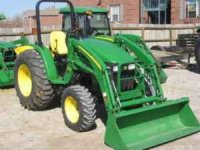LD1
Epic Contributor
Then explain why my Farmall cub cub with HP rating of 10HP can pull my landscape trailer with 1200 to 1500 pounds no sweat but my 24HP craftsman lawn tractor will burn out if I try and pull 500 with it. Both gas engines. The Briggs on that Craftsman won't do it because of the absence its torque capability or if you want to say less power. If I put that 24hp Briggs on that Cub it might work for a few hours if geared accordingly but will be toast in no time. Once again, both gas engines, so splain it to me Lucy, how can that be?
The only time HP meets torque is at 5250 RPM's. Way below these engines capabilities.
Torque is the static measurement of how much work an engine does, while power is a measure of how fast the work is being done. Since horsepower is calculated from torque, what we are all seeking is the greatest-possible torque value over the broadest-possible rpm range. Horsepower will follow suit, and it will fall in the engine speed range dictated by the many factors that affect the torque curve. I agree here
Engine designs are what go into all this. The cylinder size and bore and stroke lengths start to Both come into play. It's not all about "HP" IMO. It is about what the engine can do.
For starters, your farmall CUB is rated at 10HP drawbar, which is probabally more like 15HP at the engine. But that aside, your CUB is rated at only 1600RPM. The Brigs is probabally rated @ at least double that. Slow the Brigs down to 1600RPM and I am sure it has less HP than your Cub. If it didn't, obviously the torque would be exactally the same, simple mathematics.
But your example is covering BROAD ranve in RPM's. Since most new CUT run at nearly the same RPM across ALL Mfgs, if HP is the same, torque will also be the same.
But lets break down the fundamental deffination of HP and TQ.
Torque is how much work CAN be done.
HP is how fast it can do that work.
HP cannot be changed. Whatever the engine makes is its MAX. Torque however can be changed with gearing.
Trucks (average 1/2 ton and 3/4ton) have an average overall gear reduction of ~10:1. So If you have a P/U with 300HP/300TQ, you can esentally put ~3000ft-lbs to the ground.
Tractors on the other hand have an overally reduction in the 150:1 ballpark. So lets say a 40HP/100TQ tractor. It can put down ~15000ft-lbs to the ground (traction aside). There fore, it can absolutly pull more in a brute pulling contest. But if you geared it to run 55MPH, there is no chance of it pulling a 7k trailer at that speed like the truck. Because it lacks the overall HP.
Torque can always be changed with gearing. Simply be selecting a different gearbox, or different gear in the tranny, to accomplish what needs done. But HP remains constant. It is simply an equation of torque and RPM. Higher HP means more work dont in a given amount of time. So a higher HP engine can do more work in a given time. But higher torque can do more work at once, just at a slower pace.
And since earlier you mentioned that the "old Iron" had more torque, I looked up a few examples on tractordata.
Tractor........CI.............HP.............TQ
Ford 611.....134............48.4..........126.8
MF 135.......152............45.8..........121.7
JD4320.......149............48.1...........127
Ford 811.....172............62.6...........166
MF 165.......203............58.3...........169
Case JX70...179............62..............184
MF 185........248...........75..............292
JD 5075M......186..........75..............300
So I fail to see where the old Iron has more torque in a given HP class. Even when in some of the cases, the old iron has way more CI's. Like the MF185 and MF165.
And you still didn't explain how the 3130 makes more torque than the 3700??
The point I am trying to make is that tractors today all operate in roughly the same RPM range across the MFG's. So two tractors rated at The same HP and same RPM, torque is a spec that is not needed. Sure they can have slightly different characteristics under the curve, But not any that amount to meaningful differences. And with tractors have 150:1 gear reduction, torque is plentiful in the right gear. But HP doesnt change just by picking a higher or lower gear, that is why HP is more important. So IMO, HP and traction (tractor weight) are BOTH more important than torque when deciding which tractor can pull what and how fast.

